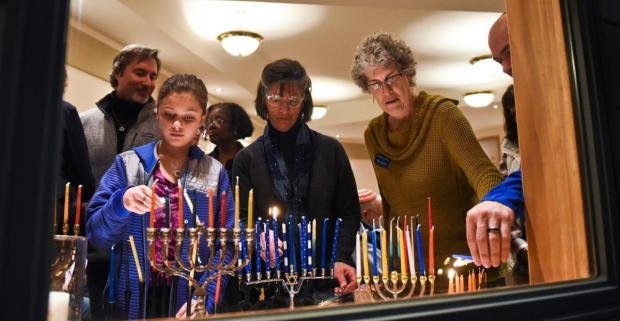The following editorial was written by Billings, MT resident Uri Barnea and published in The Billings Gazette. It is reprinted here with the permission of the author and the Gazette.
Jews all over the world recently celebrated the festival of Hanukkah by lighting the nine-branch menorah (adding an additional candle each night up to eight plus a servant candle) and savoring symbolic foods.
However, even the most thoughtful modern commentators rarely note that the historical events that Hanukkah commemorates also represent a striking, yet unheralded contribution to the evolution and establishment of Judaism’s highest value: The sanctity of life.
 |
|
People light menorahs next to a window during the 25th anniversary of Not In Our Town at Congregation Beth Aaron in Billings, MT earlier this year. (Photo: Ryan Welch, Billings Gazette)
|
The Hanukkah story, familiar to both Jews and non-Jews, is that after Alexander the Great conquered Judea (what is known today as the West Bank) in 332 BCE (Before the Common Era), the Seleucid emperor Antiochus IV conquered Egypt, and subsequently seized Jerusalem.
He gutted the Temple, desecrated it by installing idols, forbade circumcision and Jewish holiday celebrations, suppressed Jewish observance in public and prohibited Temple sacrifices, all while forcing even Jewish leaders to sacrifice to idols.
In the year 169 BCE, the Jewish priest Mattathias of the Hasmonean dynasty called upon those Jews who remained committed to tradition to revolt. His three sons, who came to be known as the Maccabees, began a military campaign against the invaders. Commanded by Judah, Mattathias’ third son, they led a successful revolt and two years later restored both the Temple and Jewish rule in the region.
The festival of Hanukkah is a symbol of the struggle for religious freedom. It marks the rededication of the Temple after its desecration by Antiochus and commemorates the “miracle of the flask of oil.” According to the Talmud (a 63-volume compendium of Judaism’s Oral Law and elucidation on this law and the Torah itself), at the rededication following the victory of the Maccabees over the Seleucid Empire, there was only enough pure oil to fuel the Ner Tamid (Hebrew for eternal flame,) in the Temple for one day. Miraculously, the oil lasted for eight days, which was the length of time it took to press, prepare and consecrate fresh olive oil. These events are commemorated with the festival of Hanukkah, also known as the Festival of Lights.
Historically, however, Hanukkah is celebrated for eight days because Antiochus forbade the Jews from celebrating the previous fall Festival of Tabernacles (Sukkot), which lasts eight days. Hence, still another name for Hanukkah is, “The Second Festival of Tabernacles.”
Although the Maccabees are credited with victory, their refusal early on to fight on the Sabbath led to the horrific loss of nearly a thousand lives to Antiochus’ forces.
After this catastrophe, it was reasoned that when attacked, Jews must defend themselves, even on Shabbat (the 7th day and the Hebrew word from which the word ‘Sabbath’ originated, and on which any creative work is forbidden). This historical event gave birth to Judaism’s ultimate moral imperative, the preservation and protection of life.
However, Jews are not merely permitted to engage in activities otherwise prohibited on the Sabbath — and almost every other Jewish law — if human life is imperiled. They are required to do so. This principle is known as Pikuah Nefesh (preserving life).
In order to maintain basic and emergency functions, many tasks, which would normally be forbidden on Shabbat, must be performed on Shabbat; for soldiers, for example, the guiding principle for Shabbat-observant is Pikuah Nefesh. When the Maccabees chose to defend themselves even on the Sabbath, they recognized life as above everything else. To understand Hanukkah as the birth of Pikuah Nefesh is to recognize the candle’s light as more than a commemoration of history’s miraculous oil lamp: We should also fully appreciate this overlooked aspect of Hanukkah in order to see the flames from the menorah as an embodiment of a divine spark of life itself.
My family and I celebrate Hanukkah each year with joy and hope. But, I think it is also a meaningful festival to all of humanity, especially during the present time, when there is so much religious intolerance in this country and around the world.
Add new comment